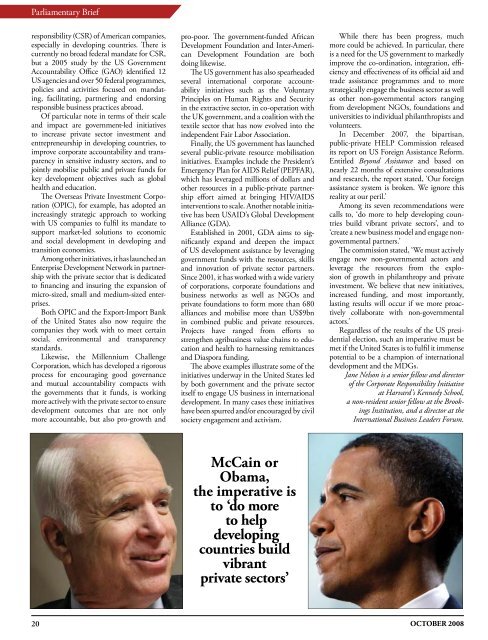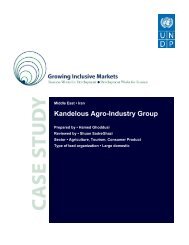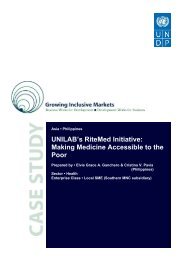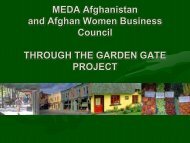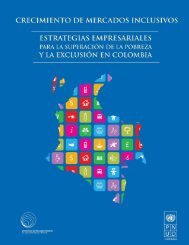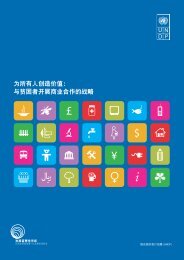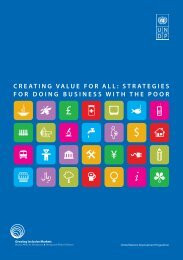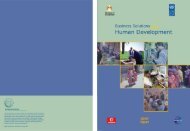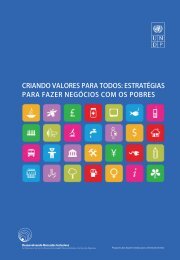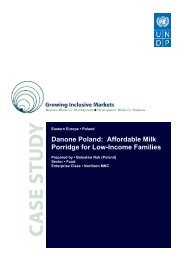Meet the consumer today's business needs to targe
Meet the consumer today's business needs to targe
Meet the consumer today's business needs to targe
- No tags were found...
Create successful ePaper yourself
Turn your PDF publications into a flip-book with our unique Google optimized e-Paper software.
Parliamentary Briefresponsibility (CSR) of American companies,especially in developing countries. There iscurrently no broad federal mandate for CSR,but a 2005 study by <strong>the</strong> US GovernmentAccountability Office (GAO) identified 12US agencies and over 50 federal programmes,policies and activities focused on mandating,facilitating, partnering and endorsingresponsible <strong>business</strong> practices abroad.Of particular note in terms of <strong>the</strong>ir scaleand impact are government-led initiatives<strong>to</strong> increase private sec<strong>to</strong>r investment andentrepreneurship in developing countries, <strong>to</strong>improve corporate accountability and transparencyin sensitive industry sec<strong>to</strong>rs, and <strong>to</strong>jointly mobilise public and private funds forkey development objectives such as globalhealth and education.The Overseas Private Investment Corporation(OPIC), for example, has adopted anincreasingly strategic approach <strong>to</strong> workingwith US companies <strong>to</strong> fulfil its mandate <strong>to</strong>support market-led solutions <strong>to</strong> economicand social development in developing andtransition economies.Among o<strong>the</strong>r initiatives, it has launched anEnterprise Development Network in partnershipwith <strong>the</strong> private sec<strong>to</strong>r that is dedicated<strong>to</strong> financing and insuring <strong>the</strong> expansion ofmicro-sized, small and medium-sized enterprises.Both OPIC and <strong>the</strong> Export-Import Bankof <strong>the</strong> United States also now require <strong>the</strong>companies <strong>the</strong>y work with <strong>to</strong> meet certainsocial, environmental and transparencystandards.Likewise, <strong>the</strong> Millennium ChallengeCorporation, which has developed a rigorousprocess for encouraging good governanceand mutual accountability compacts with<strong>the</strong> governments that it funds, is workingmore actively with <strong>the</strong> private sec<strong>to</strong>r <strong>to</strong> ensuredevelopment outcomes that are not onlymore accountable, but also pro-growth andpro-poor. The government-funded AfricanDevelopment Foundation and Inter-AmericanDevelopment Foundation are bothdoing likewise.The US government has also spearheadedseveral international corporate accountabilityinitiatives such as <strong>the</strong> VoluntaryPrinciples on Human Rights and Securityin <strong>the</strong> extractive sec<strong>to</strong>r, in co-operation with<strong>the</strong> UK government, and a coalition with <strong>the</strong>textile sec<strong>to</strong>r that has now evolved in<strong>to</strong> <strong>the</strong>independent Fair Labor Association.Finally, <strong>the</strong> US government has launchedseveral public-private resource mobilisationinitiatives. Examples include <strong>the</strong> President’sEmergency Plan for AIDS Relief (PEPFAR),which has leveraged millions of dollars ando<strong>the</strong>r resources in a public-private partnershipeffort aimed at bringing HIV/AIDSinterventions <strong>to</strong> scale. Ano<strong>the</strong>r notable initiativehas been USAID’s Global DevelopmentAlliance (GDA).Established in 2001, GDA aims <strong>to</strong> significantlyexpand and deepen <strong>the</strong> impac<strong>to</strong>f US development assistance by leveraginggovernment funds with <strong>the</strong> resources, skillsand innovation of private sec<strong>to</strong>r partners.Since 2001, it has worked with a wide varietyof corporations, corporate foundations and<strong>business</strong> networks as well as NGOs andprivate foundations <strong>to</strong> form more than 680alliances and mobilise more than US$9bnin combined public and private resources.Projects have ranged from efforts <strong>to</strong>streng<strong>the</strong>n agri<strong>business</strong> value chains <strong>to</strong> educationand health <strong>to</strong> harnessing remittancesand Diaspora funding.The above examples illustrate some of <strong>the</strong>initiatives underway in <strong>the</strong> United States ledby both government and <strong>the</strong> private sec<strong>to</strong>ritself <strong>to</strong> engage US <strong>business</strong> in internationaldevelopment. In many cases <strong>the</strong>se initiativeshave been spurred and/or encouraged by civilsociety engagement and activism.While <strong>the</strong>re has been progress, muchmore could be achieved. In particular, <strong>the</strong>reis a need for <strong>the</strong> US government <strong>to</strong> markedlyimprove <strong>the</strong> co-ordination, integration, efficiencyand effectiveness of its official aid andtrade assistance programmes and <strong>to</strong> morestrategically engage <strong>the</strong> <strong>business</strong> sec<strong>to</strong>r as wellas o<strong>the</strong>r non-governmental ac<strong>to</strong>rs rangingfrom development NGOs, foundations anduniversities <strong>to</strong> individual philanthropists andvolunteers.In December 2007, <strong>the</strong> bipartisan,public-private HELP Commission releasedits report on US Foreign Assistance Reform.Entitled Beyond Assistance and based onnearly 22 months of extensive consultationsand research, <strong>the</strong> report stated, ‘Our foreignassistance system is broken. We ignore thisreality at our peril.’Among its seven recommendations werecalls <strong>to</strong>, ‘do more <strong>to</strong> help developing countriesbuild vibrant private sec<strong>to</strong>rs’, and <strong>to</strong>‘create a new <strong>business</strong> model and engage nongovernmentalpartners.’The commission stated, ‘We must activelyengage new non-governmental ac<strong>to</strong>rs andleverage <strong>the</strong> resources from <strong>the</strong> explosionof growth in philanthropy and privateinvestment. We believe that new initiatives,increased funding, and most importantly,lasting results will occur if we more proactivelycollaborate with non-governmentalac<strong>to</strong>rs.’Regardless of <strong>the</strong> results of <strong>the</strong> US presidentialelection, such an imperative must bemet if <strong>the</strong> United States is <strong>to</strong> fulfil it immensepotential <strong>to</strong> be a champion of internationaldevelopment and <strong>the</strong> MDGs.Jane Nelson is a senior fellow and direc<strong>to</strong>rof <strong>the</strong> Corporate Responsibility Initiativeat Harvard’s Kennedy School,a non-resident senior fellow at <strong>the</strong> BrookingsInstitution, and a direc<strong>to</strong>r at <strong>the</strong>International Business Leaders Forum.McCain orObama,<strong>the</strong> imperative is<strong>to</strong> ‘do more<strong>to</strong> helpdevelopingcountries buildvibrantprivate sec<strong>to</strong>rs’20OCTOBER 2008


